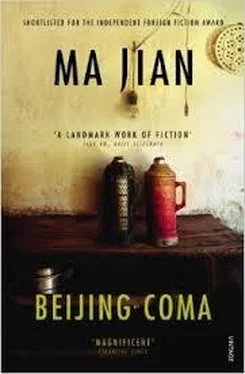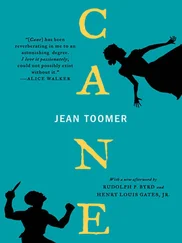The windows on each landing of the stairwell are broken. Gusts of wind blow straight through, carrying smells of gunpowder and cigarette-lighter fumes straight into my nose. When the wind is strong, I can hear the rustling of plastic bags or plastic sheeting.
I feel at once tender towards my mother and repelled by her. We live together in this small flat, both discarded by society, trying to ignore each other’s presence. We’re like scraps of paper lying in a dark corner of the street, being tossed back and forth by the wind.
My mother sits on her bed, puts on a Falun Gong instruction tape and mutters to herself, ‘The fortune teller told me I’d travel abroad soon, but I don’t believe him, because I keep dreaming of packing my bags and boarding a plane, and everyone knows that dreams always mean the opposite of what they suggest. In my dreams, I often see the Falun wheel rotating inside me, but as soon as I wake up, it vanishes… Oh Master Li Hongzhi, I beg you to install one inside my abdomen. When someone gains the Falun wheel, the energy it emits can heal their entire family…’
I remember how A-Mei liked to fiddle with her hair, examining the ends of each strand. She often did this before she went to sleep. As she fiddled away, she’d mutter to herself inconsequentially, just like my mother is doing now. Tian Yi also liked to talk to herself while scrutinising a lock of her hair. I think I heard Wen Niao playing with her hair as well a few times. Perhaps it’s just something that women like to do. But Lulu never had that habit. She braided her hair into a neat plait which she’d let dangle over her shoulder for a minute before flicking it back with a toss of her head.
At the moment of death, my spirit will escape. But what will it look like and where will it go? Although I long to leave this decaying body of mine, I cannot imagine a life beyond it. Wen Niao seems to have invaded my mind, pushing thoughts of Tian Yi to the side. Perhaps emotional attachments are formed only to satisfy physical needs, and there is nothing particularly sacred about them.
The telephone rings again. My mother goes to pick it up, mumbling that the Spring Festival Televised Gala is about to start and she doesn’t want to miss it.
‘… Yes! I wish you good fortune and prosperity too!… Don’t worry. A friend brought me a box of food. I’ve got instant noodles, milk and American ginseng… Dai Ru’s not here, so I won’t bother making any dumplings. I’ll buy some frozen ones from the supermarket… Come and play Mahjong with you? No, no. Thank you for asking, but this is a time when people should be with their families. I wouldn’t want to intrude. Besides, I can’t leave Dai Wei on his own…’
She puts down the phone and sighs, ‘What’s there to celebrate? Life just gets worse and worse with every year that passes.’
As society changes, new words and terms keep popping up, such as: sauna, private car ownership, property developer, mortgage and personal instalment loan. Apparently, most businesses have computers now, and there’s an ‘Electronics Street’ in the university district lined with shops selling personal computers and software. No one talks about the Tiananmen protests any more, or about official corruption. The Chinese are very adept at ‘reducing big problems to small problems, then reducing small problems to nothing at all’, as the saying goes. It’s a survival skill they’ve developed over millennia.
There’s not much longer to wait now. My body will soon disintegrate, and then at last I will meet my soul…
Your tongue longs to reach into the marrow or veins that are only a few millimetres away.
‘An army tank has run over a citizen near the Military Museum,’ I announced on entering the broadcast tent. ‘The soldier driving it was dressed as a civilian.’ It was stiflingly hot inside.
Shao Jian was talking to Tian Yi. ‘When Wang Fei ordered everyone to gather round the Monument, a band of students arrived waving tent poles. They looked ready for battle.’ He picked up a newspaper to fan his bare chest then slammed it down on a mosquito.
‘Don’t tell anyone about the tank, Dai Wei,’ Tian Yi said, turning to me. ‘The students might panic.’
‘The Ministry of State Security has put Pu Wenhua up in a hotel room, and ordered him to sabotage our movement,’ I said.
‘Get Zhuzi to send reinforcements,’ Tian Yi said anxiously.
‘He’s been out with the student marshals supervising the blockades. He’s exhausted.’
Shao Jian was sitting on the camp bed, preparing a list of topics for the Student Forum debate he was about to chair.
‘Where did Nuwa put those instructions about how to defend ourselves against poison gas?’ asked Mimi.
A middle-aged man walked into the tent and asked quietly who was in charge. Despite the heat, he was wearing a thick black raincoat.
Tian Yi looked up from her desk and said, ‘Why, what do you want?’
‘I’m a delegate of the National People’s Congress. Some of my colleagues and I would like to have a meeting with you. There’s something we need to discuss.’
‘If you want to talk, you’ll have to go outside,’ I said. ‘This is the broadcast station.’ I suspected he was yet another plain-clothes policeman. But Tian Yi courteously took his business card, then said, ‘Mimi, come with me. We’ll talk to them outside.’
‘I’m no negotiator,’ Mimi said. ‘You go ahead without me.’ She didn’t like being bossed about by Tian Yi.
Tian Yi looked embarrassed, so I relented. ‘All right, then, you can talk in here, if you want. But make it quick.’
‘My colleagues aren’t here,’ the man said. ‘They’re waiting for us at a restaurant.’
‘I’ll go and meet them,’ Tian Yi said. ‘Shao Jian — don’t let your debate overrun.’
I felt obliged to accompany her. We followed the man in the black raincoat across the Square. It was nearing dusk. Groups of students in vests and shorts were playing cards under the street lamps. I whispered to Tian Yi that we shouldn’t follow him into any dark, empty lanes.
But it wasn’t a kidnap. Before long, he brought us to a restaurant on Changan Avenue.
‘We’d like you to have a meal with us,’ he said. ‘Please sit down.’ There were two middle-aged men waiting at the table.
‘There’s not much point in talking to me,’ Tian Yi said. ‘Although I’m in charge of the broadcast station, all the important decisions in the Square are made by Bai Ling.’
It was a nice restaurant, with clean white walls, white tablecloths and a delicious aroma of braised beef. Behind our table stood a metre-high cooling fan.
‘We have a proposal,’ said the man sitting opposite us. He had dyed hair and a southern accent. ‘If the students announce that they will withdraw from the Square tomorrow, we will convene an emergency session of the National People’s Congress tonight and get the Party leaders’ assurance that they will not persecute you after you return to the campuses. We hope very much that you allow us to broadcast this proposal to the Square.’
‘I’m sorry, but that won’t be possible,’ Tian Yi said, her gaze shifting to the dish of stir-fried pork and green peppers the waitress had just brought to the table. ‘The broadcast station is controlled by the Defend Tiananmen Square Headquarters. We can only take orders from them.’
‘We’ve spoken to them, but they refused to help,’ said the third man, who was wearing a checked shirt. He served us some of the pork. ‘Eat up, eat up! It can’t have been easy for you, camping in the Square for so long.’
‘What positions do you hold, exactly?’ I asked, picking up my chopsticks. These three middle-aged men didn’t look like secret agents, but they didn’t look like government leaders, either.
Читать дальше












